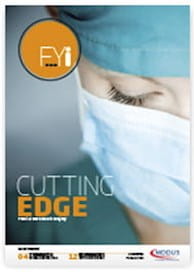
STARTING your first year of foundation training is a big step and there is plenty of advice around for new doctors getting ready to take the plunge.
Moving into your second year of training (F2) is just as challenging, yet specific guidance is a little harder to come by. This transition brings new duties and responsibilities, and there are a number of key areas to consider.
Leadership
As an F2 doctor you may no longer be the most junior person on the medical team. Chances are you will have F1 doctors (and possibly also medical students) looking to you for advice and support, and you will be able to start developing your leadership skills. As well as starting to supervise others, your individual responsibilities will increase. In some F2 posts you will need to make important decisions about admission to or discharge from hospital; this is particularly the case in posts such as A&E. You may also start to consent patients for a wider variety of procedures – it would be worthwhile to familiarise yourself with the GMC’s guidance Consent: patients and doctors making decisions together.
Legal differences
When you gain your full General Medical Council registration as an F2 doctor, there are certain changes in what you are allowed to do. For example, you will be able to write outpatient prescriptions and detain patients under section 5(2) of the Mental Health Act, both of which you were unable to do as an F1 doctor.
You should remember, however, that even F2 doctors are still required to work in “approved practice settings” (APS) until this requirement is removed by the GMC. This means new doctors have to work in a place that provides “appropriate supervision and regular appraisal”. Systems must be in place to identify and act upon concerns about a doctor’s fitness to practise; support the provision of relevant training and continuing professional development (CPD) for doctors; and provide regulatory assistance.
Different posts
During your F2 year, you may find that the type and setting of your placements are more diverse. For example F2 posts in general practice, psychiatry and public health are much more common than they are in F1. This may place you in relatively unfamiliar environments, and help you develop more flexibility in your clinical practice.
For many trainees, F2 rotations are in the same hospital as their F1 year. This will allow for some continuity and will help make the change a little less daunting than if you were starting at a completely new hospital. While you may be working with different teams in each job, you may still see some familiar faces from the past year.
Study leave and budgets
As an F2 doctor, you will be entitled to around 30 days of study leave. Some of these days will be pre-allocated by your training provider/ employing organisation (e.g. for in-house teaching, ALS course, etc.), however the remainder can be used for activities such as taster days, approved courses and research. With more than 60 medical specialties to choose from in the UK, tasters can provide a valuable insight for those struggling to decide which field is right for them. Those looking to take part can spend up to five days in a taster as they consist of either a single five day experience in one specialty or shorter periods of time in two or even three specialties. It is rare for a trainee to go on a taster that isn’t conducted by their own employing organisation due to the need for checks, issues over employment status and financial constraints.
Although study leave can’t be used to prepare for specialty exams, you are allowed to use a day to sit the exam itself. You will also be allocated a certain amount of money as part of your study budget that can be spent on events such as courses and conferences, although the exact amount varies between foundation schools.
Revalidation and ARCP
The beginning of F2 marks the start of a fiveyear GMC revalidation cycle that all doctors are required to participate in. This essentially involves demonstrating to the GMC every five years that you are up-to-date, fit to practise and are complying with the relevant professional standards. At the end of F2, and yearly throughout the rest of your training, you will also take part in the Annual Review of Competence Progression (ARCP), as you did during F1.
Future career planning
Many doctors make important decisions about their future career during F2. The core and specialty training application window comes along early in the year, so it is important to plan for this if you intend on applying. That said, many F2 doctors choose not to go straight into core or specialty training and take time out to decide on their future career path.
• Read the UKFPO’s Rough Guide to the Foundation Programme (June 2015)
This page was correct at the time of publication. Any guidance is intended as general guidance for members only. If you are a member and need specific advice relating to your own circumstances, please contact one of our advisers.
Read more from this issue of FYi

Save this article
Save this article to a list of favourite articles which members can access in their account.
Save to library
